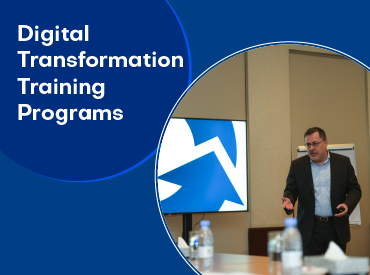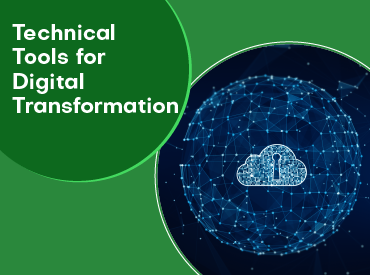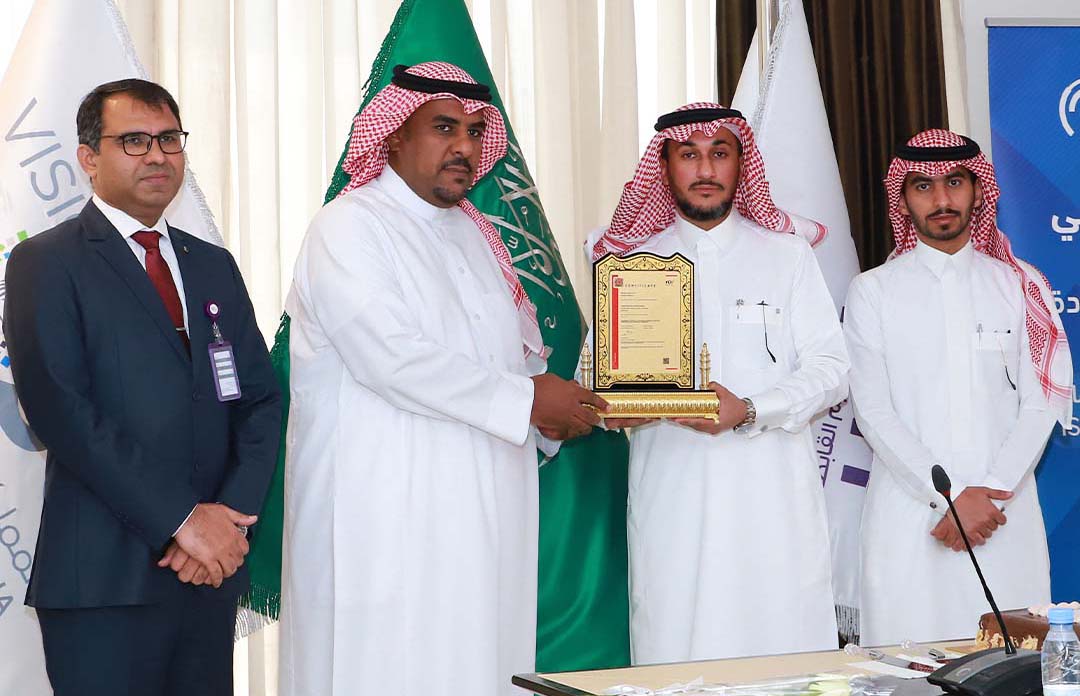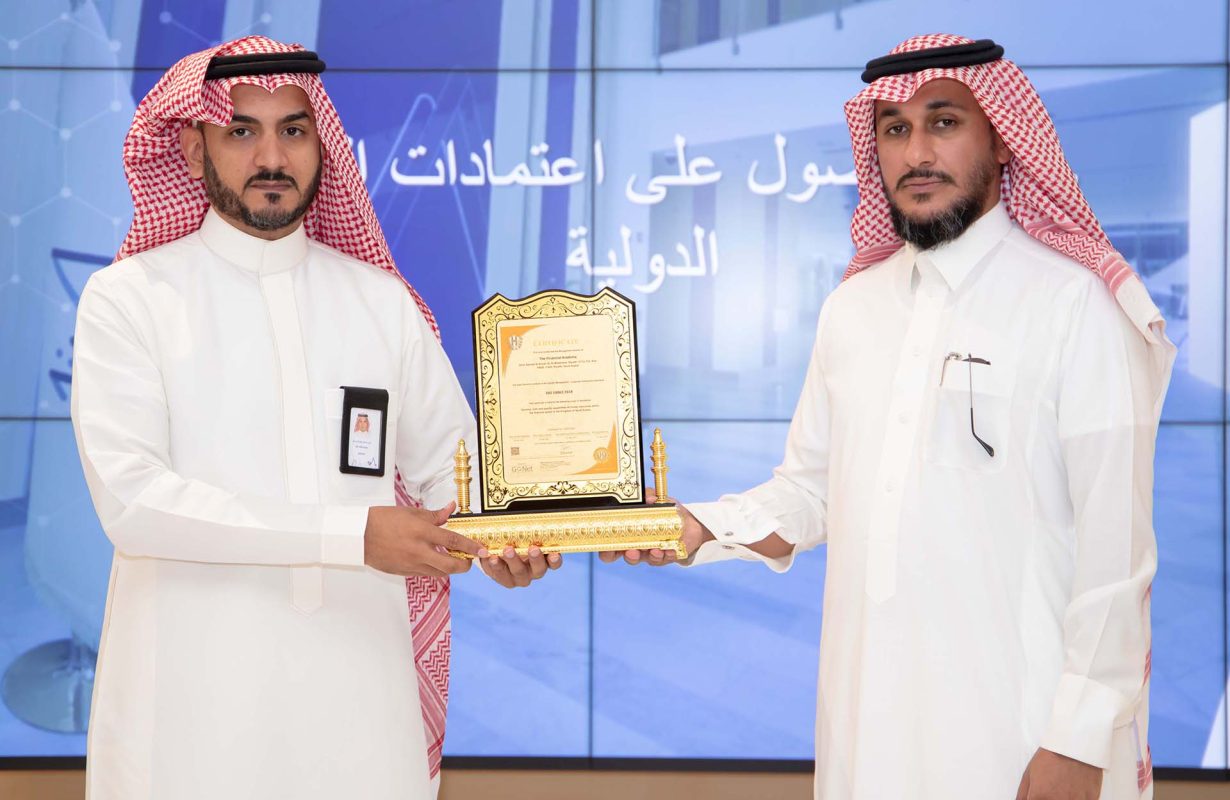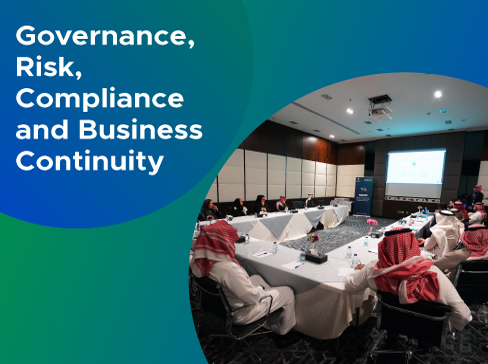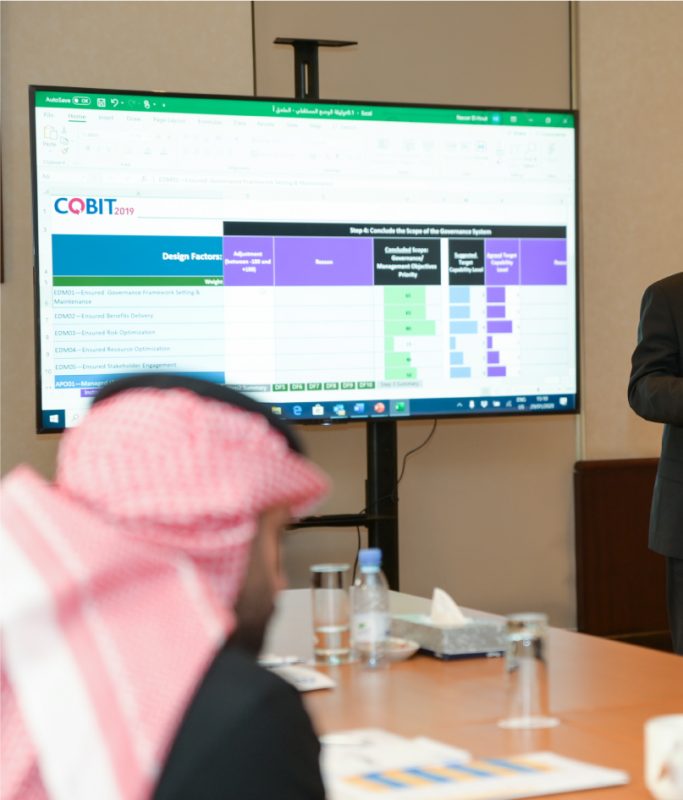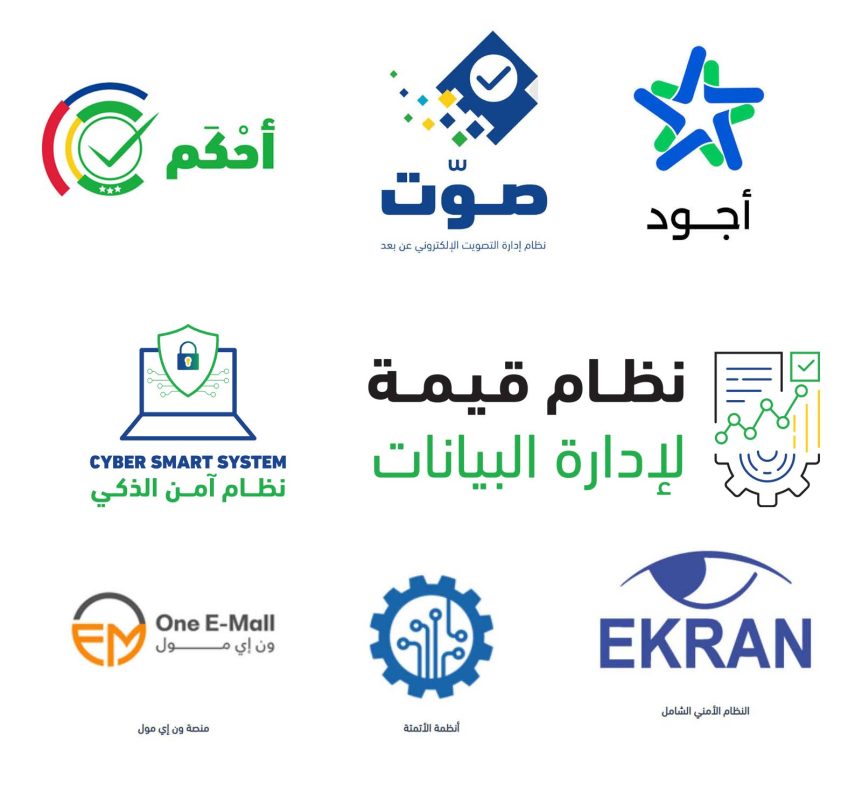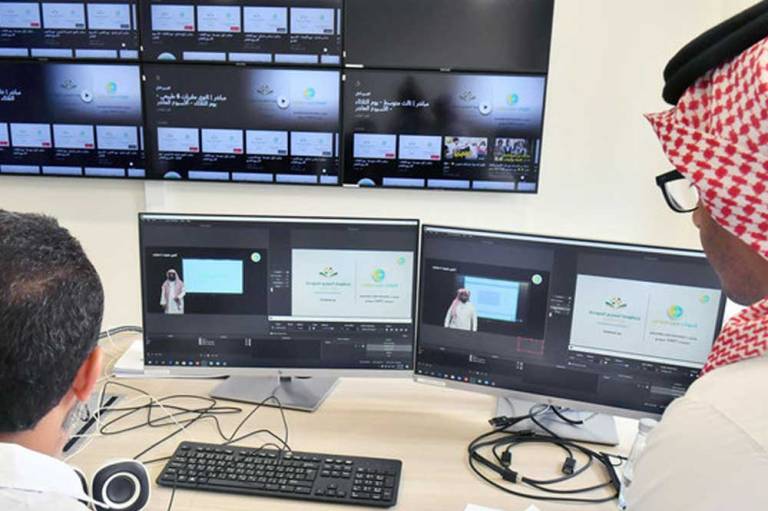
The importance of implementing Saudi Framework for Higher Education Cybersecurity (cyber-education)
The importance of the Saudi Cybersecurity Higher Education Framework (cyber-education).
representative in:
- To get to know school plans requirements for higher education programs in cybersecurity.
- Assurance of academic quality of higher education programs in cybersecurity.
- Graduating a high qualification cadre in the cybersecurity field.
- Helps to achieve efforts by reaching a safe and reliable Saudi cyberspace that enables growth and prosperity.
Cyber-education framework covers the following degree’s program in cybersecurity:
- Intermediate diploma.
- Bachelor.
- Higher diploma.
- Master.
- Doctoral.
Cyber-education framework can be applied to all educational programs and degrees in all cybersecurity specialization/ disciplines that are offered in public and private post-secondary education institutions in the Kingdom of Saudi Arabia.
The structure of the Saudi Cybersecurity Higher Education Framework (cyber-education).
7 programs.
Program description (skills, knowledge, value- responsibility- independence), Requirements for acceptance, core knowledge units, Optional knowledge modules.
- First: Intermediate Diploma program.
* Knowledge:
- General and interrelated knowledge and understanding of the foundations, theories, technical principles, and concepts in the field of cybersecurity.
- Knowing and understanding of the analytical methodologies used in cybersecurity topics and explaining the related information
* Skills:
- Employ a range of theoretical and technical knowledge related to science and adapt them to reflect theoretical understanding in specific and unfamiliar contexts in cybersecurity.
- Apply critical thinking and creativity for providing innovative practical solutions in moderately complex and unfamiliar contexts to cybersecurity.
- Use study and investigation methodologies to take advantage of their results to solve the problem of moderate complexity in cybersecurity.
- Use a variety of techniques and practices tools and adapt them to carry out the practical moderately complex activities in cybersecurity.
- Communicate inappropriate ways and demonstrate understanding and knowledge and transfer it to the beneficiaries in cybersecurity.
- Analyze and explain the numerical data; and use graphical representation in the moderately complex context in cybersecurity.
- Core knowledge units:
- Cybersecurity foundations
- Cybersecurity Design principles
- Information technology systems components
- Basic Networking
- Basics Programming
- Network defense
- Operating systems concepts
- Cyber threats
- Polices, legal, and ethics and commit to them
- Security risks analysis
- Second: Bachelor’s ( cybersecurity track).
* Knowledge:
- Knowledge of in-depth and wide range of basic concepts, theories, and foundations in cybersecurity.
- In-depth knowledge and understanding of the process, tools, techniques, policies, and practices used in cybersecurity.
- A set of specialized knowledge related to current and new development in the field of cybersecurity.
* Skills:
- Analyze and evaluate various complex information in cybersecurity.
- Critical evaluate and select cybersecurity methodologies and tools to solve problems, reduce risks, and perform cybersecurity works.
- Use study, investigations, and research methodologies in cybersecurity activities and projects.
- Perform a range of tasks and procedures by using cybersecurity tools.
- Communicate in appropriate forms and demonstrate knowledge.
- Use mathematical operations and quantitative methods to process data.
* Core knowledge units:
- Cybersecurity foundations.
- Cybersecurity Design principles.
- Information technology systems components.
- Basic Networking.
- Basics Programming.
- Network defense.
- Operating systems concepts.
- Cyber threats.
- Polices, legal, and ethics and commit to them.
- Security risks analysis.
- Data structure.
- Databases.
Third: Bachelor’s ( cybersecurity major).
* Knowledge:
- Knowledge of in-depth and wide range of basic concepts, theories, and foundations in cybersecurity.
- In-depth knowledge and understanding of the process, tools, techniques, policies, and practices used in cybersecurity.
- A wide range of specialized knowledge related to current and new development in the field of cybersecurity.
* Skills:
- Analyze and evaluate various complex information in cybersecurity.
- Critical evaluate and select cybersecurity methodologies and tools to solve problems, reduce risks, and perform cybersecurity works.
- Use study, investigations, and research methodologies in cybersecurity activities and projects.
- Perform a range of tasks and procedures by using cybersecurity tools.
- Communicate in appropriate forms and demonstrate knowledge.
- Use mathematical operations and quantitative methods to process data.
* Core knowledge units:
- Cybersecurity foundations.
- Cybersecurity Design principles.
- Information technology systems components.
- Basic cybersecurity.
- Basic Networking.
- Basics Programming.
- Network defense.
- Operating systems concepts.
- Cyber threats.
- Polices, legal, and ethics and commit to them.
- Security risks analysis.
- Data structure.
- Databases.
- Algorithm.
- Network technology and protocols.
- Network security administration.
- Operating system hardening.
- Fourth: Higher Diploma ( for information technology background).
* Knowledge:
- Specialized and in-depth range of basic foundations, concepts, and theories knowledge in cybersecurity.
- Rigorous Knowledge and understanding of the processes, tools, techniques, policies, and practices used in cybersecurity.
- Deep understanding of new developments and advanced topics in cybersecurity.
* Skills:
- Select theoretical concepts, techniques, and tools for conducting cybersecurity work, assess, and use them in complex contexts.
- Evaluate the major concepts, principles, and theories in cybersecurity, and reviewed them critically.
- Provide and design innovative solutions in complex and advanced contexts for cybersecurity problems.
- Communicate in different ways to demonstrate specialized knowledge and skills with different categories of beneficiaries.
* Core knowledge units:
If a student doesn’t complete one or more of the core knowledge units of a bachelor’s degree program as cybersecurity Track before admission, they must be completed in the study of this degree program.
- Fifth: Higher Diploma (For non-information technology track).
* Knowledge:
- A range of Specialized theoretical knowledge of major foundations, theories, and concepts in cybersecurity.
- Rigorous Knowledge and understanding of regulatory and ethical aspects and monitor compliance to controls and standards in cybersecurity.
- Deep understanding of new development in cybersecurity.
* Skills:
- Apply special principles, methodologies, and tools in advanced cybersecurity context.
- Analyze, build, and update polices, organizational, and technical aspects, and monitor compliance with them.
- Evaluating and critically reviewed the major concepts, principles, and methodologies.
- Perform a range of tasks and procedures by using tools to assessing cyber risks.
- Communicate in different ways to demonstrate specialized knowledge and skills with different categories of beneficiaries.
- use quantitative and qualitative methods to process information and data in advanced cybersecurity contexts.
* Core knowledge units:
- Cybersecurity Foundations.
- Cybersecurity Design Principles.
- IT Systems Components.
- Cyber Threats.
- Policy, Legal, Ethics, and Compliance.
- Security Risk Analysis.
- Sixth: Masters.
* Knowledge:
- Knowledge of In-depth and broad range of theoretical and technical topics in cybersecurity.
- Deep understanding of the process and practices of cybersecurity to protect and defend cyber systems and respond to cyber-attacks.
- Deep understanding of modern and advanced developments and theories in cybersecurity.
* Skills:
- Use a wide range of specialized tools, methods, and practices based on knowledge of the latest cybersecurity development.
- Plan and implement advanced cyber research.
- Use a wide range of methodologies, methods, and practices in advanced and complex cybersecurity contexts.
- Use specialized and advanced processes, techniques, and tools to perform complex works in cybersecurity.
- Communicate in different ways to demonstrate specialized knowledge and skills with different categories of beneficiaries.
- use quantitative and qualitative methods to process information and data in advanced cybersecurity contexts
* Core knowledge units:
- A student must complete one or more of the core knowledge of bachelor’s (cybersecurity track) and in case they are not completed, he must be completed in the study program of this degree program.
- competition of a thesis or project on a cybersecurity topic.
- Seventh: Doctoral.
* Knowledge:
- A wide range and in-depth knowledge of cybersecurity.
- Detailed knowledge and understanding of cybersecurity process and practices for protect data, systems, and networks.
- Inclusive knowledge and understanding of recent development and emerging issues and challenges in cybersecurity.
* Skills:
- Evaluate and combine and critically reviewed modern concepts, principles, and theories, and reviewed them critically, and developing a high complex and modern product and services in cybersecurity.
- Use a wide range of techniques, methods, and practices in cybersecurity, and evaluate and critically review them.
- Develop, adapt, and apply advanced research and investigation methodologies to create original knowledge that contribute significantly to cybersecurity.
- Using modern tools and devices in cybersecurity to carry out new, high complex, and difficult practical activities.
- Communicate with different ways to share knowledge, and make a professional and practical conversation with peers, specialized groups and whole society.
- Processing quantitative and qualitative data, and use it in research and projects that related to cybersecurity.
* Core knowledge units:
- A student must complete one or more of the core knowledge of bachelor’s (cybersecurity track) and in case they are not completed, he must be completed in the study program of this degree program.
- Completion a scientific dissertation in a cybersecurity topic.
The way that RMG’s can help you
Renad AlMajed for information technology company (RMG) has been succeeded of being one of the early companies that able of applying Saudi Framework for Higher Education in Cybersecurity (cyber- education) by a group of experts and consultants, the company provides many services such as:
- Make a maturity assessment.
- Implementation of the Saudi Cybersecurity Higher Education Framework (Cyber-education).
- Develop the appropriate policies and protection to each facility.
- Develop performance indicators.
- Account assurance services.
- Providing training and knowledge transfer services.
CONTACT US TODAY AND WE WILL BE HAPPY TO SERVE YOU
Frequently asked questions
- The main objective: to help for achieving efforts to reach a safe and reliable Saudi cyberspace and to qualify and prepare national cadres who Possess deep and sufficient knowledge in cyber security.
- Recognizing the requirements of the study plans for higher education in cybersecurity programs.
- Ensure the academic quality assurance of higher education programs in cyber security.
Cyber-education framework selects 7 programs:
- Intermediate Diploma program.
- Bachelor’s ( cybersecurity track).
- Bachelor’s ( cybersecurity major).
- High diploma ( for information technology track).
- High diploma (For non-information technology background).
- Master’s
- PhD/ Doctoral.
– Intermediate diploma and picklers high school certificates or quit it if it qualitative.
– Higher diploma for specialists and masters.
– Bachelors certification in cybersecurity or computer science or any related field.
– English proficiency.
* Higher diploma for non-specialist
- Bachelor’s certification
- English proficiency
* PhD/ Doctorate:
- Master certification degree in cyber security computer science or any related field
- English proficiency.





